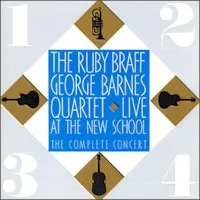Year: 1981
File: MP3@320K/s
Time: 51:46
Size: 119,8 MB
Art: Front
(1:39) 1. Way Down Yonder in New Orleans
(4:48) 2. Knee Drops
(4:20) 3. West End Blues
(4:42) 4. At A Georgia Camp Meeting
(5:25) 5. I Want a Little Girl
(4:04) 6. China Boy
(4:48) 7. Creole Belles
(3:28) 8. Sugar
(5:57) 9. The Kazoos
(3:29) 10. Down Home Rag
(5:11) 11. On Green Dolphin Street
(3:49) 12. Everybody Loves My Baby
The Dutch Swing College Band "DSCB" is a traditional dixieland band founded on 5 May 1945 by bandleader and clarinettist/saxophonist Peter Schilperoort.
Highly successful in their native home of The Netherlands, the band quickly found an international following. It has featured such musicians as Huub Janssen (drums), Henk Bosch van Drakestein (double bass), Kees van Dorser (trumpet), Dim Kesber (saxes), Jan Morks (clarinet), Wout Steenhuis (guitar), Arie Ligthart (banjo/guitar), Jaap van Kempen (banjo/guitar), Oscar Klein (trumpet), Dick Kaart (trombone), Ray Kaart (trumpet), Bert de Kort (cornet), Bert Boeren (trombone), Rod Mason, Rob Agerbeek (piano) among many others.
The band provided the interval act for the Eurovision Song Contest 1976 presented live from Den Haag.
The band continues to tour extensively, mainly in Europe and Scandinavia, and record directed by Bob Kaper, himself a member since 1967, following the former leader, Peter Schilperoort's death on 17 November 1990. Schilperoort had led the band for more than 45 years, albeit with a five-year sabbatical from 13 September 1955, when he left to pursue an engineering career before returning to lead the band again officially on 1 January 1960.
https://en.wikipedia.org/wiki/Dutch_Swing_College_Band
Highly successful in their native home of The Netherlands, the band quickly found an international following. It has featured such musicians as Huub Janssen (drums), Henk Bosch van Drakestein (double bass), Kees van Dorser (trumpet), Dim Kesber (saxes), Jan Morks (clarinet), Wout Steenhuis (guitar), Arie Ligthart (banjo/guitar), Jaap van Kempen (banjo/guitar), Oscar Klein (trumpet), Dick Kaart (trombone), Ray Kaart (trumpet), Bert de Kort (cornet), Bert Boeren (trombone), Rod Mason, Rob Agerbeek (piano) among many others.
The band provided the interval act for the Eurovision Song Contest 1976 presented live from Den Haag.
The band continues to tour extensively, mainly in Europe and Scandinavia, and record directed by Bob Kaper, himself a member since 1967, following the former leader, Peter Schilperoort's death on 17 November 1990. Schilperoort had led the band for more than 45 years, albeit with a five-year sabbatical from 13 September 1955, when he left to pursue an engineering career before returning to lead the band again officially on 1 January 1960.
https://en.wikipedia.org/wiki/Dutch_Swing_College_Band
Digital Dixie




















